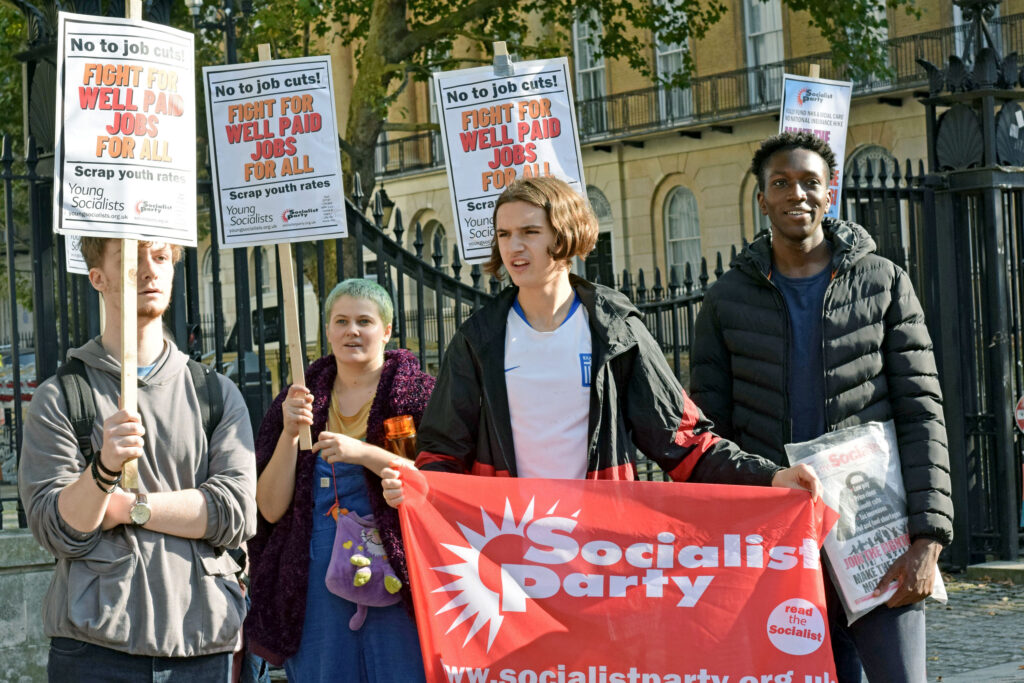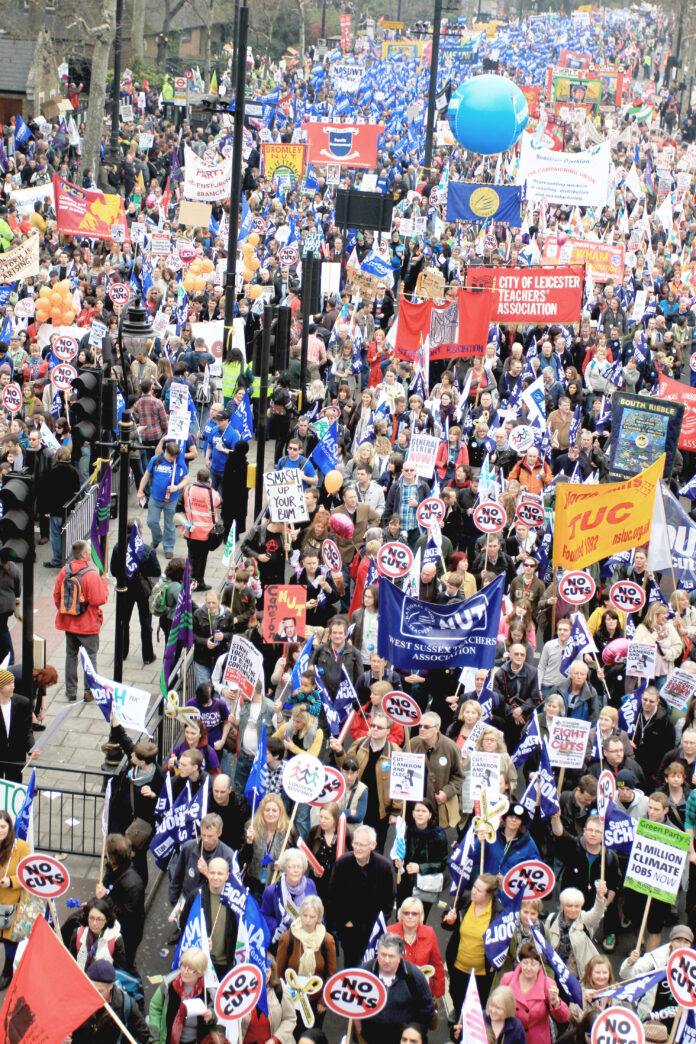Workers’ struggles show way forward
TUC must give a lead and not capitulate to ‘national unity’
Editorial of the Socialist Issue 1171
Workers are facing an escalating cost-of-living squeeze. The Resolution Foundation estimates that families will lose an average of £1,000 in real terms this year. That would amount to the biggest crash in living standards for nearly half a century.
Real inflation is nearly 8%. But with energy prices set to soar, in some cases by over 100%, double-digit inflation seems inevitable. Already when workers fill up their cars they can see that petrol prices have gone through the roof. No matter how much the Tories and the bosses try to pin the blame for this on the war in Ukraine, prices have been soaring for months.
Given this, the decision of the Trades Union Congress (TUC) to call off its ‘Britain Needs A Pay Rise’ demonstration, planned in Blackpool on 19 March, is a backward step in the fight of workers to keep their heads above water.
Billed as a ‘national’ protest, having a start time of 10am in Blackpool was never going to be the serious mobilisation that is necessary to give a lead. It smacked of a ‘box-ticking’ exercise or, as it was a protest outside the Tory Party spring conference, a leg-up to Starmer’s New Labour local election campaign. Blackpool Trades Union Council has confirmed it is going ahead however in order that there is a trade union and labour movement protest outside the Tory Party Spring Conference at 11am from the Comedy Carpet at the Tower to the Winter Gardens.
Serious campaign needed
Nevertheless, it could have been the launch of a real campaign that then set the date for a demo in London or another major city. This is what is needed now. In explaining the ‘postponement’ of the demo, the TUC has mentioned a ‘national mobilisation’ in London in the summer and of “running a series of ‘town hall’ meetings around the country in the run-up to build for London.” This would be welcome, provided it is seriously built for, but the demo date must be set now.
It is possible that the ill-thought out character of the Blackpool march posed a likely poor turnout and this is the reason why it was cancelled. But union activists will be concerned that the TUC has bent to national unity pressure in not wanting to protest outside a Tory Party conference in the midst of the Ukraine war.
In September 2020, TUC leader Frances O’Grady stood with Tory Chancellor Rishi Sunak and the head of the bosses’ CBI federation when the government was intending to water down the furlough scheme. In the end, the Tories were forced to retreat given the scale of the Covid economic crisis and the likely anger from workers. But this was the most blatant expression of the capitulation of many union leaders to Covid national unity that saw most official disputes called off in the first few months of lockdown.
This disarmed many workers at the height of the pandemic, giving confidence to the employers and their Tory government to go on the attack, especially with brutal ‘fire and rehire’. This revealed the reality of national unity and any attempt to resurrect it now is a sham.
However, workers have shown that they have been up for the fight. Firstly to face down the bosses’ offensive, and then to fight for pay rises as raging inflation bites. The strike wave is continuing, with important struggles such as that of the victorious Barts NHS workers, and the bitter strike of Coventry bin workers against a vicious Starmerite Labour council which is victimising reps and spending millions of pounds to try and break the strike.
Now that the TUC demo is off, workers should head to Coventry on Saturday 26 March for Unite’s solidarity rally with the bin workers. And these workers, and the many others on the picket lines, should head up any TUC ‘town hall’ meetings. That would be the best way to mobilise the numbers for a mass national demo, as a step towards building nationally coordinated strike action.
Eleven years ago, the TUC and the unions called a national demonstration in London against the austerity of Cameron, Osborne and Clegg. It brought 750,000 onto the streets and led directly to a two million-strong pensions strike, which was effectively a public sector general strike. In the midst of a rising tide of workers’ struggle, such a call now could have a huge impact. It would put the workers’ movement centre stage, drawing the real class lines necessary to take the struggle forward, not national unity confusion.
A workers’ programme to end the cost-of-living crisis

Rishi Sunak will present the government’s spring statement on 23 March. His speech will come just a week before the cost-of-living crisis is set to escalate further. April will bring a rise to the energy price cap, the national insurance hike and council tax rises, on top of the already rising cost of goods and services.
The government’s official figures put the Retail Price Index at 7.8% in January, predicted to rise to over 9% in April – both of these figures are underestimates for the real hit to working-class households. A tub of marge has seen a 50% increase in the last year, and a bag of apples is up 27%.
Sunak no doubt hopes to use the war in Ukraine to shield himself and his party from working-class anger. But the war in Ukraine cannot be blamed for Tory-imposed tax rises and dismal public sector pay offers.
Our bills were going up before the war, because the bosses are increasing their prices in a quest to maintain or increase their profits. And the Tories will resist making any meaningful dent in the profits of the capitalist class they represent.
Workers are already taking action to defend themselves, and strikes are winning pay rises. We need the trade union leaders to give a lead (see above). That means uniting together the different struggles as well as taking steps towards creating a new mass workers’ party, around a programme to end the cost-of-living crisis created by profit-driven capitalism.
We say:
Price rises
- No rise in the energy price cap. Nationalise energy and other utilities under democratic workers’ control and management to reduce bills by removing the profit motive
- Scrap planned increase in public transport fares. Return transport into public hands, to guarantee a fully funded, free, environmentally friendly, sustainable transport system
- Stop price rises, end bosses’ profiteering. Open the books of big retailers to inspection by trade unions. Nationalise the big retailers under democratic workers’ control, run to meet need, not profit
Pay, benefits, pensions
- An immediate above-inflation pay rise for workers to restore wages after over a decade of pay freezes and below inflation rises
- Regular pay increases for all, linked to trade-union agreed measures of inflation
- Raise the minimum wage to £15 an hour, without exemptions
- Restore the additional £20-a-week Universal Credit payment. End the benefit cap. Living benefits and pensions for all who need them, rising with the cost of living
Tax the rich, not the workers
- Scrap the planned rise in national insurance, freeze council tax and scrap student debt – tax the rich instead
Housing
- Freeze council and social housing rents
- Rent controls to cap rents – decided by elected bodies of tenants, housing workers and trade union representatives
New workers’ party
- No trust in Starmer’s Labour to fight in our interests. For a new mass workers’ party based on trade union and workers’ struggle
- Socialism End the chaos of the capitalist market. For a socialist plan of production, based on the public ownership of the top 150 companies and banks, run under democratic working-class control and management








